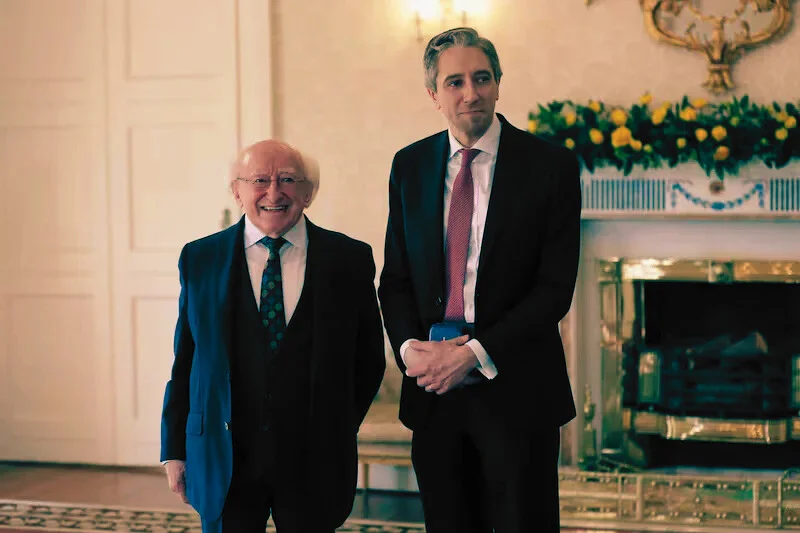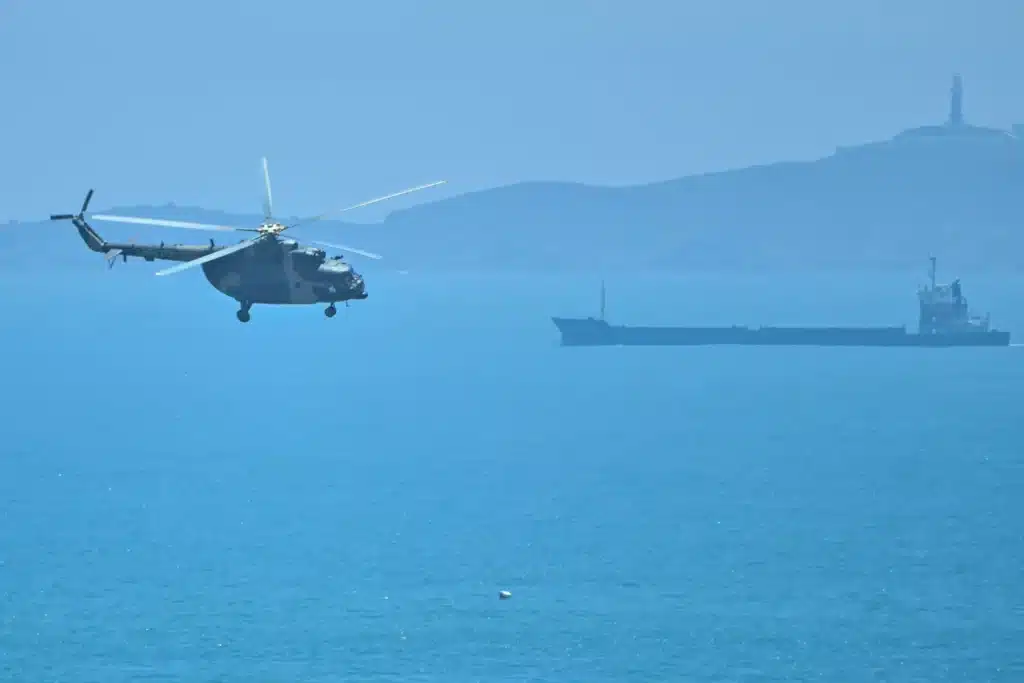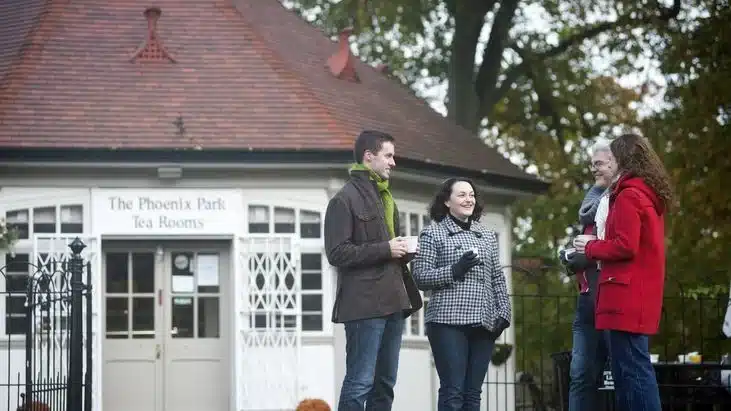President Higgins to Consider Dissolution of 33rd Dáil at Taoiseach’s Request

This afternoon, Irish Prime Minister Simon Harris will visit the presidential residence Áras an Uachtaráin where he will seek permission from President Higgins to dissolve the current Dáil in order to set the ball rolling for the general elections that everyone in Ireland is waiting for.
Harris, who is currently in Hungary attending the European Political Community Summit, will likely be back in Dublin by mid-afternoon to begin the political campaign for the 34th Dáil.
If President Higgins sanctions the dissolution of the Dáil, Ireland shall progress to an election campaign period for three weeks culminating in the election that will be held on 29th November.
Taoiseach’s Official Request and Election Preparations
Upon his return, the Taoiseach will brief the public on this important development from the Government Buildings. After that statement, he will proceed to Áras an Uachtaráin to request President Higgins to dissolve the 33rd Dáil. Politicians think that this will be granted without any parleys from President Higgins to get the ball rolling for a new government formation in Ireland.
This will be a landmark decision as Simon Harris, Fine Gael leader, heads straight into electioneering. It is said that the next journeys for Harris would involve actively campaigning around Dublin to gain public backing for his plan for the future of Ireland. At the same time, other key actors also align their plans to gain attention to the voter populations among leaders and politicians.
Sinn Féin’s Mary Lou McDonald, a vocal critic of Fine Gael and Fianna Fáil, has seized this opportunity to present Sinn Féin as the only viable alternative for those seeking a change from what she calls the “Tweedledum and Tweedledee” dominance of Fianna Fáil and Fine Gael.
She argues that the upcoming election offers an “historic choice” for Irish voters: stay with the current government, or let a socialist government with Sinn Féin at its head – which, according to her, will produce revolutionary changes throughout Ireland.
Pressure Builds for President Higgins to Postpone Dissolution over Key Laws
Before Taoiseach Simon Harris can ask the Dáíl to dissolve, another issue has reared its head. Other advocacy groups have been writing to President Higgins asking him not to dissolve the Dáil until a major item of legislation, the Occupied Territories Bill, was through the Oireachtas. The bill that has irish MPs proposing a ban on trade between Ireland and Israeli settlements in the Occupied Palestinian Territories has attracted much attention and controversy.
Mothers Against Genocide has been especially active, sending a letter to the President of Ireland to appeal to Áras an Uachtaráin for postponing the dissolution of Dáil by invoking presidential powers.
The letter calls on President Higgins to support the passage of the Occupied Territories Bill, noting that the bill has been shut down by the government repeatedly.
The group wrote, “Our Government has blocked and stalled this bill at every turn, from the beginning.” We hope, dear President Higgins, that you can be the final contributor to getting the Occupied Territories Bill enacted now.”
Government Position on the Occupied Territories Bill
Tánaiste Micheál Martin has come out to reassure the citizens that the government is on course to propel the Occupied Territories Bill. Martin emphasised that the government is “prepared to go the full distance” with the bill, even if it requires navigating the complexities of European legal frameworks.
Martin tried to explain his stance to the Select Committee on Foreign Affairs and Defence by pointing out that, while he thinks the bill is feasible, it will not be possible to pass it in the short term. The government has been accused of being evasive and not presenting legal advice received on the bill to the committee.
Martin’s commitment to such change is, nonetheless, unmistakable. ‘So it can be done, we are satisfied – and we’re going to do it and we’re going to progress this,’ he said.
He insisted nevertheless, that passing such legislation requires actions and processes that are more than the 33rd Dáil’s term, regardless of the benefits and for the significant backing it receives from the public and different parts of the government.
President Higgins: Moderate Diplomatic Role during Political Rift
The SIPTU election outcome has put President Higgins in a dilemma with a clear consequence of his decision that might shape the future of decision politics in Ireland. Although his role is mainly symbolic, only he can decide whether to accept the Taoiseach’s request or not.
On one hand, acceding to the Taoiseach’s request for dissolution means that the moves towards election campaigning is set to start immediately which various commentators have argued is needed for party renewal and the electorate.
However, postponing dissolution, as requested by Mothers Against Genocide, would buy one more time for the debate of the Occupied Territories Bill, in line with Ireland’s position in the international human rights and ethical trade.
The situation can be quite problematic for President Higgins. Should he go by the political calendar and proceed with the political request by Taoiseach Simon Harris or should he listen and act for humanitarian values?
This decision shows that there is much more that is expected of him as a head of state and government in whose hands public opinion and government decision making are intertwined. President Higgins’s actions in this regard may conceivably affect the future legislative priorities’ management, especially regarding electoral processes.
Elections and the Landscape of Political Parties
With another election year approaching in Ireland, Mr Higgins’s action has ramifications for all the political parties and their Roadmaps for the state. Fine Gael, Fianna Fáil and Sinn Féin are all in competition for supremacy in a bid to be deemed irresistible by the Irish voter.
Since the Taoiseach is expected to dissolve the 33rd Dail, the election process is making a move more progressive as Mary Lou McDonald framing the vote as vote on Irish leadership.
McDonald’s comments about Fine Gael and Fianna Fáil as “Tweedledum” and “Tweedledee” highlight the intense competition to sway public opinion.
In its case, the election is that indispensable opportunity to contest these traditional parties’ hegemony and argue for a left-wing coalition. Having ordered for a left wing government, McDonald wants to take advantage of voter’s wishes for change in government power by sharply polarising with the conventional political orchestra.
President Higgins, in other words, will frame this epic election because his decision to dissolve the Dáil now or later shapes the form and content of the pre-campaign period.
While Ireland’s political backers along with stakeholders from various volunteering organisations hope and wait keenly for his response, he intends to provide a decision as the country adapts to modern political administration.
In the days to come, President Mchael D. Higgins will be under pressure, with many watching to see how he deals with the requests as they come in.
Frequently Asked Questions
Why is Taoiseach Simon Harris meeting with President Higgins?
Taoiseach Simon Harris is visiting President Higgins at Áras an Uachtaráin to request the dissolution of the 33rd Dáil, a move necessary to initiate the general election process in Ireland.
When is the general election expected to be held if the Dáil is dissolved?
If President Higgins grants the request to dissolve the Dáil, Ireland will enter a three-week election campaign period, leading to voting on November 29.
What impact does the dissolution of the Dáil have on legislation?
The dissolution may delay legislative actions, such as the Occupied Territories Bill, which campaigners have asked President Higgins to keep the Dáil intact to allow further debate and a potential vote.
What are the key political positions in the upcoming election?
Sinn Féin, led by Mary Lou McDonald, positions itself as an alternative to Fianna Fáil and Fine Gael, emphasizing a left-wing government against what she describes as the “Tweedledum and Tweedledee” dominance of the other parties.
What role does President Higgins play in the election process?
President Higgins holds the power to dissolve the Dáil upon the Taoiseach’s request, a decision that influences the timing and structure of Ireland’s election process and legislative priorities.
LATEST NEWS
DISCOVER MORE






